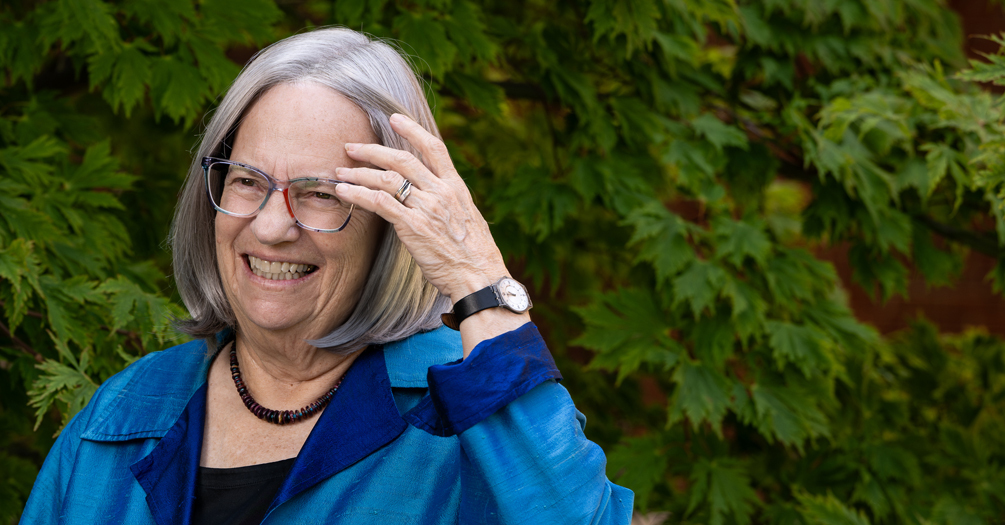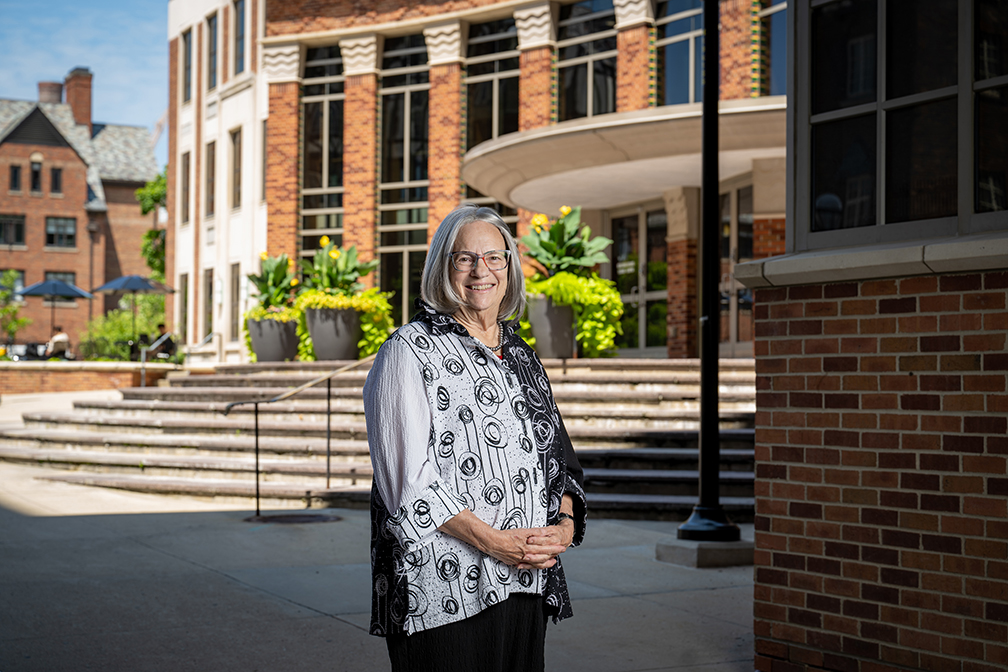Barbara Israel: Driven to give back

Pioneering community-based participatory researcher commits to fostering future public health leaders
Professor Emerita of Health Behavior & Health Equity
By Bob Cunningham
Barbara Israel’s career at the University of Michigan School of Public Health has been defined by her unwavering commitment to community-based participatory research (CBPR), health equity and her students.
Israel has spent the majority of her career fostering and supporting community-academic partnerships—particularly in Detroit—aimed at understanding and addressing social determinants of health inequities.
As the founder of the Detroit Community-Academic Urban Research Center (Detroit URC) in 1995, she has worked with community and academic colleagues to develop collaborative partnerships that have significantly impacted the health and well-being of Detroit residents.
As she transitions into retirement from her position as professor of Health Behavior & Health Equity, her legacy will continue to inspire future public health leaders dedicated to promoting health equity and social change.
A career rooted in power sharing with communities
Israel’s commitment to health equity is deeply personal.
Growing up in North Carolina during segregation in the 1950s, she witnessed firsthand the injustices faced by Black people.
“I remember signs on water fountains that read ‘for colored only’ and separate entrances to movie theaters,” she said.
Seeing students engage with community partners, making insightful comments, and applying classroom concepts to real situations is incredibly rewarding.”
— Barbara Israel
These experiences, coupled with her upbringing in a Jewish household that valued social justice, shaped her lifelong commitment to addressing health inequities.
In her professional life, Israel has consistently worked with her academic and community partners to translate research findings into interventions and actionable policies. Her scholarly work has focused on how broader social determinants such as air quality, housing and access to resources impact health outcomes.
“It’s about who I’m working with and how we can collectively bring about change—that’s what inspires and motivates me,” she said.
Israel was drawn to public health early in her career.
Completing her master’s and doctoral degrees in Health Education from the School of Public Health, University of North Carolina at Chapel Hill, she was influenced by her mentor, Dr. Guy Steuart, who spoke about the critical role of communities in identifying and addressing public health issues.
“I was trained in the field of health behavior and health education, and working here at Michigan Public Health felt like a natural progression,” Israel said. “My passion has always been centered around addressing broad issues like air quality and access to resources, not just individual behavior change.”
The creation of the Detroit URC allowed Israel to put her principles into practice.
“The overall goal of the Center is to foster and support community-academic partnerships that address social determinants of health inequities,” she said.
This approach, which promotes power sharing, co-learning and mutual benefit, has been the cornerstone of her career. It enables her to work with faculty, students, community partners and staff who share her values and passions.

Recognizing challenges, embracing collaboration
Working in public health is not without its challenges.
“It hasn’t been without hard work—lots of nights and weekends,” Israel said.
Yet her time at Michigan Public Health has been marked by positive experiences, largely due to the collaborative culture of the school.
“We have incredibly motivated students and dedicated faculty and staff,” she said. “Interdisciplinary research is essential for addressing the complex issues that communities face, and I’ve been fortunate to work with colleagues from multiple departments, disciplines and communities.”
This spirit of collaboration is evident in the Detroit URC’s many accomplishments. Over the years, the Center has seen numerous CBPR partnerships positively impact the health and well-being of Detroit residents. For example, such partnerships have examined and addressed the physical and social environment and their impact on childhood asthma, diabetes and cardiovascular disease.
“We’ve created partnerships that have resulted in individual, community and broader policy changes and increased the acceptance of CBPR as a viable research approach,” Israel said.
Highlights and memorable moments
Israel’s career is rich with memorable moments involving students, faculty and community partners.
One standout experience is the course she taught on CBPR, which includes a trip to Detroit so students can meet with Detroit URC partners.
“Seeing students engage with community partners, making insightful comments, and applying classroom concepts to real situations is incredibly rewarding,” she said.
These interactions often leave a lasting impact on students, nurturing a deeper understanding and appreciation for community engagement in public health, Israel said.
Another significant achievement is the CBPR Partnership Academy, which the Detroit URC has facilitated for nearly a decade. This year-long program brings together community and academic teams from across the country for intensive training and mentorship on how to conduct CBPR.
It’s hard to believe I’ve been in this job for over 40 years. But the partners I have worked with, the work we’ve done—and the work we continue to do—truly makes a difference. That’s what drives me.”
— Barbara Israel
“We’ve had over 58 teams from 25 states, Washington, DC, and three Tribal Nations participate,” Israel said. “Over 70% of the participants have been from groups underrepresented in research. The program’s success is a testament to the dedication of our faculty, community partners, staff and students.”
Israel’s dedication to public health has not gone unnoticed.
She has received numerous accolades, including the Association of Schools and Programs of Public Health (ASPPH) Practice Excellence Award and the CDC Foundation’s Elizabeth Fries Health Education Award.
“I’ve never done what I do with any thoughts of awards,” Israel said. “I’m incredibly grateful and appreciative, but it’s important to recognize that these achievements are a collective effort.”
This ethos of collective recognition underscores Israel’s approach to her work.
“The awards belong to all of us—faculty, students, staff and community partners—who have worked together to achieve these milestones,” she said.
Fostering future leaders and sustaining the Detroit URC
After recently being named professor emerita, Israel is focused on giving back.
She has established the Barbara Israel Endowed Student Internship Fund to support students interested in CBPR and promoting health equity in Detroit, and she has contributed to the Detroit URC Gift Fund.
“I wanted to ensure that students have the opportunity to learn how to conduct CBPR and to also support the sustainability of the Detroit URC,” she said.
Israel’s commitment to fostering future public health leaders is evident in her hopes for the Student Internship fund.
“I’ve seen how students and communities benefit from our work, and I want to ensure this continues,” she said, echoing Michigan Public Health’s top priority: student support.
The fund aims to provide students with hands-on learning experiences on the process and impact of CBPR. In addition, the Gift Fund will support the infrastructure of the Center and help sustain its work promoting health equity in Detroit and beyond.
Israel plans to stay involved with several CBPR partnerships for at least another year. She is excited to see longtime colleague Enrique Neblett, professor of Health Behavior & Health Equity and new director of the Detroit URC, step into this role. In addition, she is delighted to welcome Katrina Ellis, MPH ’08, PhD ’15, associate professor of Social Work, as the new associate director.
“I will be supporting Enrique and Katrina to ensure the Center continues to evolve and address new opportunities and challenges under their leadership,” she said.
Reflecting on her career, Israel feels a deep sense of accomplishment and gratitude.
“It’s hard to believe I’ve been in this job for over 40 years,” she said. “But the partners I have worked with, the work we’ve done—and the work we continue to do—truly makes a difference. That’s what drives me.”
Support students at Michigan Public Health
